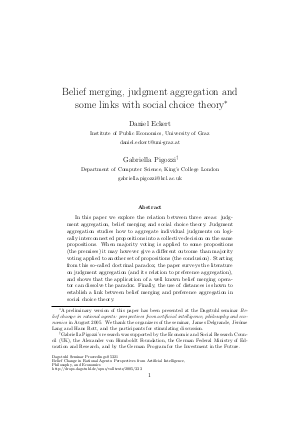Belief merging, judgment aggregation and some links with social choice theory
Authors Daniel Eckert, Gabriella Pigozzi
-
Part of:
Volume:
Dagstuhl Seminar Proceedings, Volume 5321
Part of: Series: Dagstuhl Seminar Proceedings (DagSemProc) - License:
 Creative Commons Attribution 4.0 International license
Creative Commons Attribution 4.0 International license
- Publication Date: 2005-11-21
File

PDF
DagSemProc.05321.8.pdf
- Filesize: 214 kB
- 14 pages
Document Identifiers
Subject Classification
Keywords
- Judgment aggregation
- belief merging
- preference aggregation
- social choice theory
Metrics
- Access Statistics
-
Total Accesses (updated on a weekly basis)
0Document
0Metadata
Abstract
In this paper we explore the relation between three areas: judgment aggregation, belief merging and social choice theory. Judgment aggregation studies how to aggregate individual judgments on logically interconnected propositions into a collective decision on the same propositions. When majority voting is applied to some propositions (the premises) it may however give a different outcome than majority voting applied to another set of propositions (the conclusion). Starting from this so-called doctrinal paradox, the paper surveys the literature on judgment aggregation (and its relation to preference aggregation), and shows that the application of a well known belief merging operator can dissolve the paradox. Finally, the use of distances is shown to establish a link between belief merging and preference aggregation in social choice theory.
Cite As Get BibTex
Daniel Eckert and Gabriella Pigozzi. Belief merging, judgment aggregation and some links with social choice theory. In Belief Change in Rational Agents: Perspectives from Artificial Intelligence, Philosophy, and Economics. Dagstuhl Seminar Proceedings, Volume 5321, pp. 1-14, Schloss Dagstuhl – Leibniz-Zentrum für Informatik (2005)
https://doi.org/10.4230/DagSemProc.05321.8
BibTex
@InProceedings{eckert_et_al:DagSemProc.05321.8,
author = {Eckert, Daniel and Pigozzi, Gabriella},
title = {{Belief merging, judgment aggregation and some links with social choice theory}},
booktitle = {Belief Change in Rational Agents: Perspectives from Artificial Intelligence, Philosophy, and Economics},
pages = {1--14},
series = {Dagstuhl Seminar Proceedings (DagSemProc)},
ISSN = {1862-4405},
year = {2005},
volume = {5321},
editor = {James Delgrande and Jerome Lang and Hans Rott and Jean-Marc Tallon},
publisher = {Schloss Dagstuhl -- Leibniz-Zentrum f{\"u}r Informatik},
address = {Dagstuhl, Germany},
URL = {https://drops.dagstuhl.de/entities/document/10.4230/DagSemProc.05321.8},
URN = {urn:nbn:de:0030-drops-3330},
doi = {10.4230/DagSemProc.05321.8},
annote = {Keywords: Judgment aggregation, belief merging, preference aggregation, social choice theory}
}
